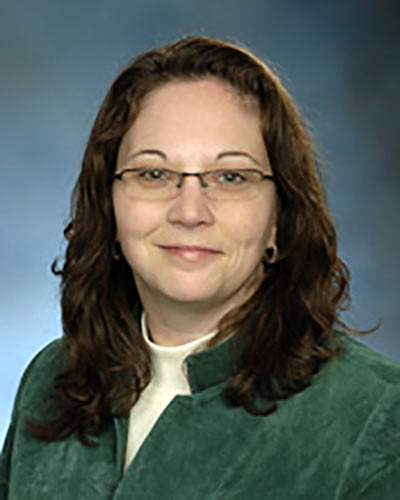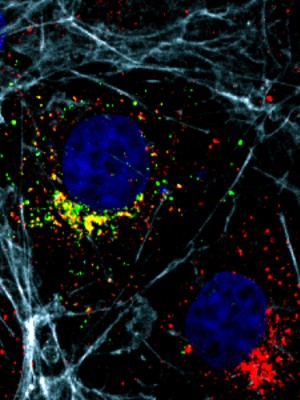November 21, 2017 | Joanne Morrison

New Classification and Names of Genetic Diseases, Cancers and Other Diseases Will Help Biomedical Researchers in the Field
Researchers at the University of Maryland School of Medicine (UM SOM) are searching through medical journals, databases and other authoritative sources to establish standard terms for diseases as a way to help future researchers better understand a wide range of diseases like cancer. The work involves a time-intensive manual curation process, examining the breadth of information, naming systems and levels of evidence in order to integrate information and bridge data across resources.
“We are helping researchers navigate the changing landscape of disease knowledge,” said Lynn M. Schriml, Ph.D., Associate Professor of Epidemiology and Public Health, Institute for Genome Sciences member, and the principal investigator on the recently funded, $3,395,191 five-year U41 Genomic Resource grant that was awarded by the National Human Genome Research Institute.
Dr. Schriml is leading the Human Disease Ontology project. She is joined on the U41 award with UM SOM co-Investigators Michelle Giglio, Ph.D., Associate Professor of Medicine, Institute for Genome Sciences member, Linda Jeng, M.D., Ph.D., Associate Professor of Medicine, Carol L. Greene, M.D., Professor of Pediatrics, Cynthia F. Bearer, M.D., Ph.D., FAAP, Cobey Professor and Director of Neonatology and Professor of Pediatrics, Melanie L. Leu, M.D., Assistant Professor of Pediatrics, and Richard Lichenstein, M.D., Professor of Pediatrics.
The project team will augment the content of the Human Disease Ontology, advance the classification of complex genetic diseases, reclassify human cancers by cell of origin and tissue type and produce alternative disease classification views based on environmental exposures. “We work to identify and integrate the most current information about a disease,” said Dr. Schriml.
Dr. Schriml’s Human Disease Ontology project will provide alternate cellular, molecular and environmental mechanistic profiles and terms of human disease. “As more data is gathered, we work with research groups to figure out if it is a new disease or a novel sub-type,” said Dr. Schriml. When a community updates their classification of an area of disease, e.g. immune disease, Dr. Schriml and her team integrate the new information, updating previous classification systems and coordinating these changes across pertinent biomedical databases.
Dr. Schriml’s team is excited to develop, as part of this work, a novel differential diagnosis disease ontology. Exploring ontological representations for heterogeneous disorders will provide insight on the etiological complexity of complex diseases.
“This is important work that will help researchers around the world better collaborate and understand complex diseases over time, particularly as our researchers apply genomic tools to advance personalized medicine,” said E. Albert Reece, MD, PhD, MBA, vice president for medical affairs at the University of Maryland and the John Z. and Akiko K. Bowers Distinguished Professor and dean of the University of Maryland School of Medicine.
About the University of Maryland School of Medicine
Commemorating its 210th Anniversary, the University of Maryland School of Medicine was chartered in 1807 as the first public medical school in the United States. It continues today as one of the fastest growing, top-tier biomedical research enterprises in the world -- with 43 academic departments, centers, institutes, and programs; and a faculty of more than 3,000 physicians, scientists, and allied health professionals, including members of the National Academies of Science, Engineering and Medicine, and a distinguished recipient of the Albert E. Lasker Award in Medical Research. With an operating budget of more than $1 billion, the School of Medicine works closely in partnership with the University of Maryland Medical Center and Medical System to provide research-intensive, academic and clinically-based care for more than 1.2 million patients each year. The School has over 2,500 students, residents, and fellows, and nearly $450 million in extramural funding, with more than half of its academic departments ranked in the top 20 among all public medical schools in the nation in research funding. As one of the seven professional schools that make up the University of Maryland, Baltimore campus, the School of Medicine has a total workforce of nearly 7,000 individuals. The combined School and Medical System (“University of Maryland Medicine”) has a total budget of $5 billion and an economic impact of nearly $15 billion on the state and local community. The School of Medicine faculty, which ranks as the 8th-highest public medical school in research productivity, is an innovator in translational medicine with 600 active patents and 24 start-up companies. The School works locally, nationally, and globally, with research and treatment facilities in 36 countries around the world. Visit medschool.umaryland.edu/
Learn More
• Department of Epidemiology and Public Health
• Institute for Genome Sciences
Contact
Department of Anesthesiology
(410) 328-6120 (phone)
(410) 328-5531 (fax)
swalsh@som.umaryland.edu
University of Maryland School of Medicine
Joanne Morrison
Director of Marketing and Public Relations
University of Maryland School of Medicine
jmorrison@som.umaryland.edu
Office:(410) 706-2884
Mobile:(202) 841-3369
Related stories

Wednesday, September 18, 2024
UM School of Medicine Establishes Three New Endowed Professorships through Maryland E-Nnovation Awards and UMB Matching Funds
University of Maryland School of Medicine (UMSOM) Dean Mark T. Gladwin, announced today that the School of Medicine has been awarded $2 million in matching funds from the Maryland E-Nnovation Initiative Fund (MEIF), administered by the Maryland Department of Commerce. The funds, totaling $4 million when combined with UMB private funding, will enable the establishment of three endowed research professorships.

Monday, June 21, 2021
UM School of Medicine Researchers Discover Genetic Cause of Neurodevelopmental Disorder
University of Maryland School of Medicine (UMSOM) researchers identified a new gene that may be linked to certain neurodevelopmental disorders and intellectual disabilities. The researchers believe that finding genes involved in certain types of developmental disorders, provide an important first step in determining the cause of these disorders and ultimately in developing potential therapies for treating them.

Wednesday, May 31, 2017
When It Comes to Health, Does Zip Code Matter More than Genetic Code?
A range of powerful evidence shows unequivocally that where you live, as well as your social circumstances, play a huge role in your health. This was the message delivered by Anthony B. Iton, MD, JD, MPH, Senior Vice President of Healthy Communities at the California Endowment, in a lecture April 18 at the University of Maryland School of Medicine (UM SOM).
